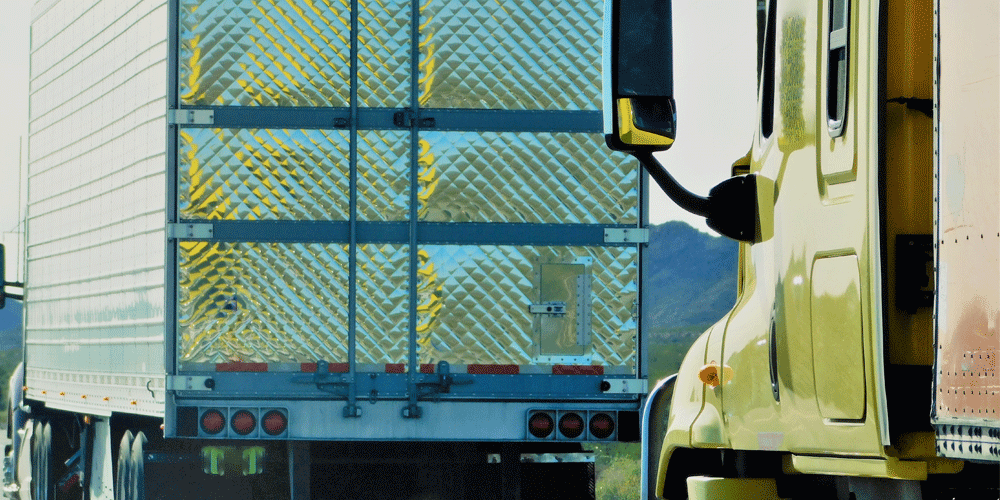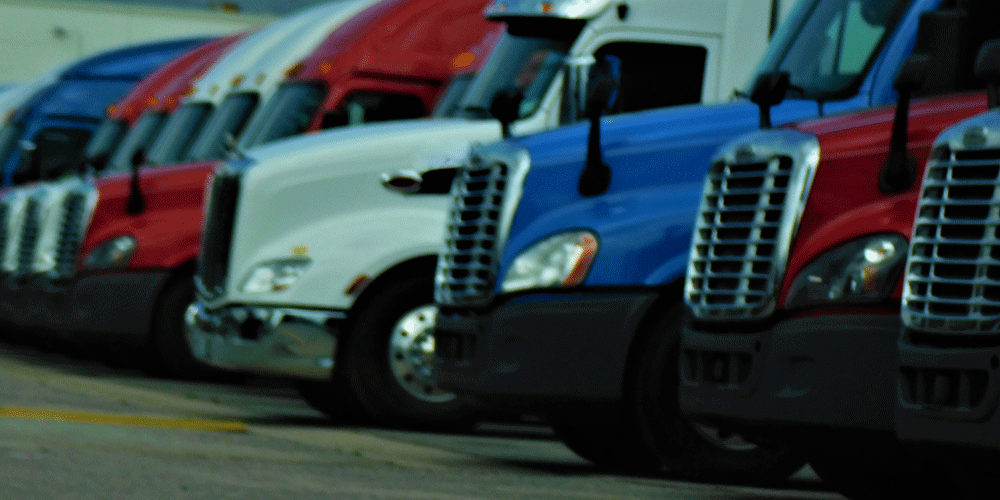Is Being a Lease-Purchase Truck Driver Right for Me? [4 Considerations]
Angela began her career at ATS in 2003. In her tenure here, she’s been a driver manager and an operations manager and she’s worked in driver services. She’s currently the director of vans operations.
Are you ready to sign a lease for a new truck?
Can you handle taking care of regular truck payments and managing your own operation?
Are you financially responsible? Good at planning loads?
Do you understand the industry?
Are you motivated to succeed?
In my tenure in the trucking industry, where my job is to help drivers succeed, I’ve seen a lot of drivers through the years who would’ve had a lot more success had they been a company driver instead of a lease driver and vice versa. With those driver stories in mind, I’m going to help you determine if you’re best staying in your current lane as a company driver or if it’s time to put on that blinker and change lanes.
In this article, you’ll learn more about what it takes to be a lease driver, including the financial responsibility and the crucial characteristics you must exhibit to succeed.
When you finish reading, you’ll understand if you have what it takes to lease a truck and run as an independent contractor or if you need to spend a little more time in the industry before taking that step.
Is Leasing Right for You? 4 Considerations
Don’t make a rash decision. Just because you see other drivers in the industry striving to lease or own their truck doesn’t mean that has to be your path. Many drivers love being company drivers and there’s nothing wrong with that.
Consideration #1: Are You Ready for the Financial Responsibility?
The number one factor you need to consider before leasing your truck is whether or not you can afford it.
You take on major financial responsibility when you decide to lease your truck. Not only will you need to make weekly truck payments, but you’ll also have a slew of other expenses to think about.
When you’re a company driver, you don’t have to worry about truck payments, insurance payments, maintenance costs and so on. Even when you’re broken down, you’ll have a company there to support you and sometimes even pay you layover pay to cover the cost of accommodations, meals and missed load opportunities.
As an independent contractor, that all changes. It’s not only your responsibility to make sure you’re moving enough loads to cover the cost of your weekly truck payment, but you’ll also be paying for everything from fuel to truck insurance. Your company may offer you certain benefits, but whatever benefits package you choose will come out of your pocket.
You’ll be required by most lease companies to have a maintenance account. That’s because companies want to protect their assets and ensure that you have the money to fix the asset should it break down.
If you don’t have enough money in your maintenance account to fix your truck, you might have to pay for the repairs out-of-pocket. If you aren’t funneling money aside and saving for a rainy day, one major repair could be enough to sink you. There are Department of Transportation (DOT) regulations you must follow to ensure your truck is in good working order. You won’t have a choice whether to fix the truck or not.
As an independent contractor, you’ll also need to source the open market for benefits, including medical, dental and life. You’ll also need to set up retirement accounts so you can retire one day. It’s important to have these things in place to protect yourself and your family. One resource that can help you is the Owner-Operator Independent Drivers Association (OOIDA).
Keep in mind that taxes are also a huge financial responsibility when you’re leasing your truck instead of driving as a company driver. You might be getting huge settlement checks, but you can’t just treat it like cash in hand.
Because you’re an independent contractor, you won’t have money taken out of your settlements for taxes. It’s your responsibility to keep track of your expenses, including keeping all of your receipts. You should work with a financial professional to do your taxes. They’ll likely recommend that you set up quarterly payments for your taxes.
To succeed, you’ll need to have a high level of responsibility when it comes to finances. You shouldn’t just be good at making your truck payments, you should be anticipating your upcoming expenses and setting money aside for them.
Consideration #2: Are You Familiar With the Trucking Industry?
If you’re fairly new to the trucking industry, you may want to consider spending more time in the industry as a company driver before pursuing leasing. This’ll give you more time to understand the industry. You’ll become familiar with the ins and outs of the industry, including common pitfalls.
You should know about freight lanes, backhaul and headhaul markets and how leasing works. You should know how to be profitable no matter what the market looks like. You should know how to successfully plan your loads.
As a company driver, start getting curious about the loads you’re given. Start asking questions and see if you can help your dispatcher plan your loads. This’ll give you a better understanding of how the industry works.
Consideration #3: Are You Comfortable Choosing Your Loads?
Most company drivers run under forced dispatch, which means that their driver manager or dispatcher sends them loads and, barring any conflicts, the driver has to move that load.
When you’re an independent contractor, you’ll still have a driver manager, but they’ll offer you several load options instead of one. You have the freedom of choice. This is extremely appealing to many drivers. They want the freedom to be able to make their own choices, and this is one way you can do that. If you don’t want to be under forced dispatch, you won’t have to be as an independent contractor.
However, the freedom of choice comes with great responsibility. While your driver manager won’t deliberately give you loads designed to make you fail, you’ll still be responsible to select the loads that you feel will make you more profitable overall and will get you into good freight lanes. You need to understand the market and your operating costs in order to make an informed decision about the loads you choose to haul.
You must be selective about your loads based on freight lanes, backhaul markets and headhaul markets and more. You’ll need to start booking your loads out a few weeks in advance so you can keep moving.
Rather than just taking a load because it avoids an area you don’t like driving in or it takes you to an area you’ve always wanted to travel to, be strategic about your choices. A driver who chooses their loads just based upon the areas they want to visit is a driver who’s not ready to be a lease driver.
Load selection is a good indication of how successful you’ll be as a lease driver.
Despite the fact that you’ll be choosing your own loads, you still have a customer base, defined lanes and commitments to the company. Per your lease contract with the company, you’ll be expected to meet the customer’s needs.
Consideration #4: Are You Motivated to Succeed?
There are parts of a job that no one wants to do — there are parts of my job that I don’t want to do. But that’s how it goes when you’re running a business. Sometimes you have to do things you don’t love in order to make your business succeed — whether that means taking a load into an area you don’t prefer or reserving some of your downtime to complete your tax preparation paperwork.
If you aren’t motivated to succeed — and willing to make decisions that are most beneficial to your business — then leasing your truck might not be right for you. You have to be the person that’s motivating yourself to keep moving and hauling as many loads as legally and safely as possible to maximize your earnings.
You have to think of it as a business, because it is. You have to be motivated to make your business succeed, which doesn’t just include running freight. It includes taking care of your truck and being very mindful of the loads you choose to haul as well as being organized and keeping good track of your records.
Every decision you make will have a consequence and you have to be willing to shoulder that. The company will support you only to an extent; self-reliance is the key to having ultimate success as an independent contractor.
Explore Your Lease-Purchase Options
For many drivers, leasing is the gateway to owning your truck and running as an owner-operator. It feels good to complete the lease and pay off that truck. It’s a huge accomplishment that many drivers aspire to reach.
Maybe you have a legacy you want to carry out. Maybe trucking is something your grandfather or dad did before you and you want to follow in their footsteps. However, know that if it isn’t right for you, you shouldn’t pursue it. Carefully consider the questions above. If you aren’t cut out for leasing, you can be in a world of hurt and cause yourself major financial strife.
If you’re ready to lease, check out these topics to further guide your decision.
![Is Being a Lease-Purchase Truck Driver Right for Me? [4 Considerations]](https://blog.drive4ats.com/hubfs/Images/Blog/Should%20I%20Be%20an%20IC/ATSTruckNearFarmLandFEATURED.png)



